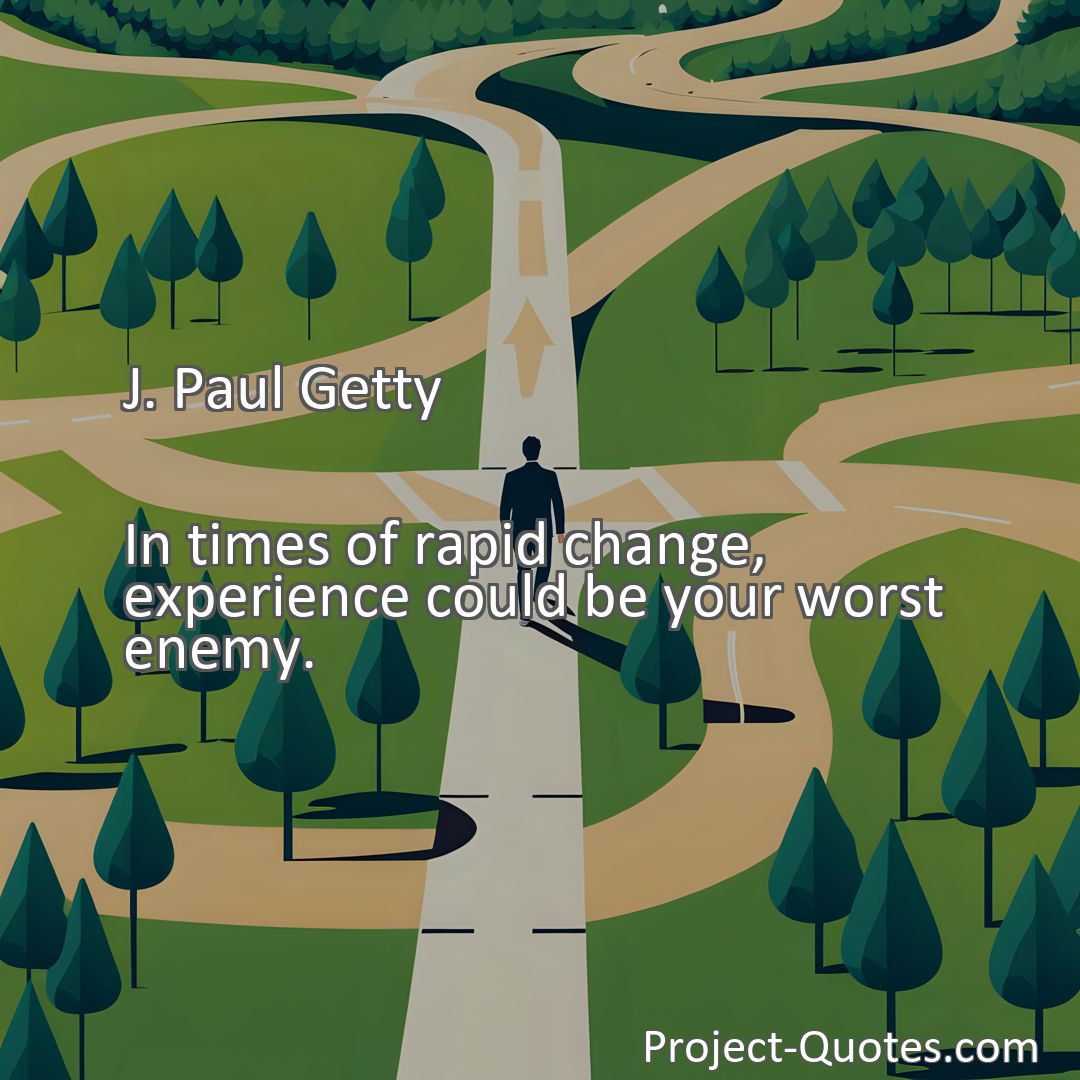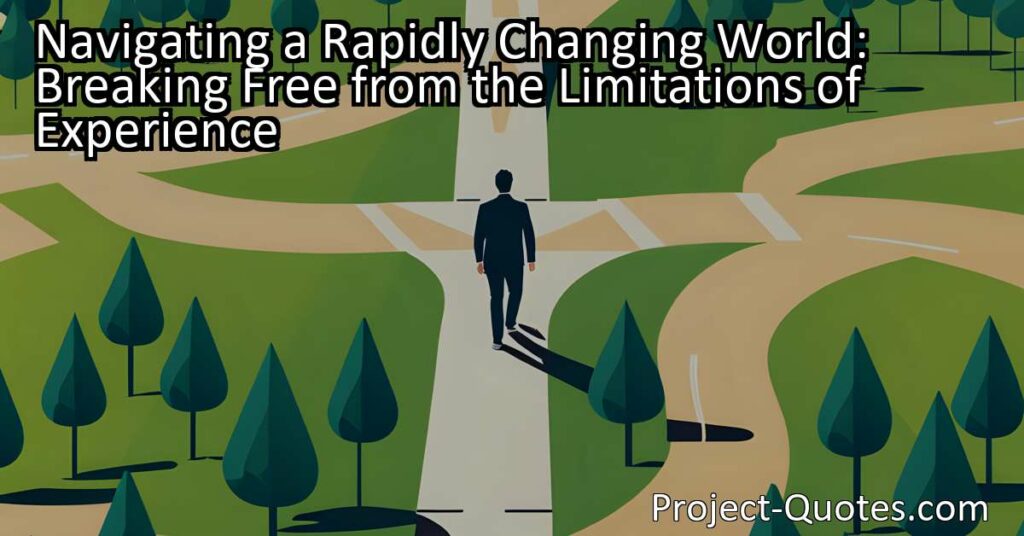In times of rapid change, experience could be your worst enemy.
J. Paul Getty
Navigating a Rapidly Changing World: Breaking Free from the Limitations of Experience In a rapidly changing world characterized by technological advancements and evolving norms, J. Paul Getty’s quote reminds us that relying solely on past experiences can hinder our ability to adapt. To break free from these limitations, we must embrace a growth mindset, seek diverse perspectives, cultivate adaptability, engage in continual learning, and embrace failure as an opportunity for growth. By doing so, we can effectively navigate the challenges of a changing world and forge a path forward that is adaptable and sustainable.
Table of Contents
Meaning of Quote – In times of rapid change, experience could be your worst enemy.
In the words of J. Paul Getty, a renowned businessman and philanthropist, “In times of rapid change, experience could be your worst enemy.” This insightful quote reminds us that the predictable and familiar ways of doing things may not always be suitable when navigating through turbulent times. Getty’s words shed light on the importance of embracing change and adapting to new circumstances, even if it means letting go of our past experiences and assumptions.
Living in the 21st century, we find ourselves amidst a rapidly changing world characterized by technological advancements, global interconnectedness, and evolving societal norms. The pace of change is unparalleled, and what worked yesterday may not necessarily work tomorrow. Our experiences, though valuable and instructive in their own right, can sometimes hinder our ability to adapt to these new realities.
Let’s dive deeper into the essence of Getty’s quote and explore the reasons why experience can sometimes be a hindrance during times of rapid change.
One fundamental reason is that our experiences shape our thinking and create certain biases. As we go through life, we accumulate a wealth of knowledge and expertise that forms the basis of our perceptions and actions. While this can serve us well in familiar situations, it can also limit our ability to consider alternative approaches. When faced with change, we may find ourselves relying too heavily on past experiences, closing ourselves off to new ideas and opportunities.
Furthermore, experience can make us resistant to change. As humans, we tend to develop certain habits and routines that bring us comfort and security. When the familiar is disrupted by change, we often experience a sense of unease and resistance. This resistance can stem from our attachment to the known, as well as a fear of the unknown. Our experiences, therefore, act as a form of anchor, tethering us to the past and inhibiting our ability to embrace new possibilities.
Another way in which experience can become our worst enemy in times of rapid change is through the concept of complacency. When we have been successful in the past, it is natural to develop a sense of complacency, thinking that what worked before will work again. This can blind us to the need for innovation and adaptation, leaving us ill-prepared for the rapidly evolving landscape. As Getty suggests, experience alone is not always enough; we must be willing to question our assumptions and challenge the status quo.
So, how can we break free from the limitations of experience and adapt to rapid change effectively? Here are a few strategies to consider:
1. Embrace a growth mindset: A growth mindset is the belief that our abilities and intelligence can be developed through dedication and effort. Embracing a growth mindset allows us to view change as an opportunity for learning and personal growth. Instead of relying solely on our past experiences, we can approach new situations with curiosity and a willingness to learn.
2. Seek diverse perspectives: Surrounding ourselves with diverse individuals and perspectives can expand our thinking and challenge our preconceived notions. By engaging in conversations with people from different backgrounds, industries, or age groups, we can gain new insights and broaden our understanding of the changing world around us.
3. Cultivate adaptability: Developing our adaptability skills enables us to respond effectively to unexpected circumstances. This involves being open-minded, flexible, and willing to step out of our comfort zones. Embracing change with a sense of curiosity rather than fear can help us navigate through challenging times.
4. Continual learning: In times of rapid change, learning becomes an ongoing process. We must commit to continually updating our knowledge and skills to stay relevant. This can involve taking courses, attending workshops, reading books, or even seeking mentorship. The key is to remain curious and proactive in our pursuit of knowledge.
5. Embrace failure as a stepping stone: Change often comes with obstacles and setbacks. It is essential to reframe failure as a valuable learning opportunity rather than a reflection of our abilities. By embracing failure and learning from it, we can adapt and improve our approach as we navigate through uncertain times.
In conclusion, J. Paul Getty’s quote, “In times of rapid change, experience could be your worst enemy,” serves as a timely reminder that our past experiences should not dictate our actions and responses during periods of rapid change. While experience undoubtedly carries value, we must be careful not to let it hinder our ability to adapt and innovate. By embracing a growth mindset, seeking diverse perspectives, cultivating adaptability, engaging in continual learning, and embracing failure as an opportunity, we can effectively navigate the challenges of a rapidly changing world. Let us approach change with open minds and hearts, ready to embrace the unknown and forge a path forward that is both adaptable and sustainable.
I hope this quote inspired image brings you hope and peace. Share it with someone who needs it today!


